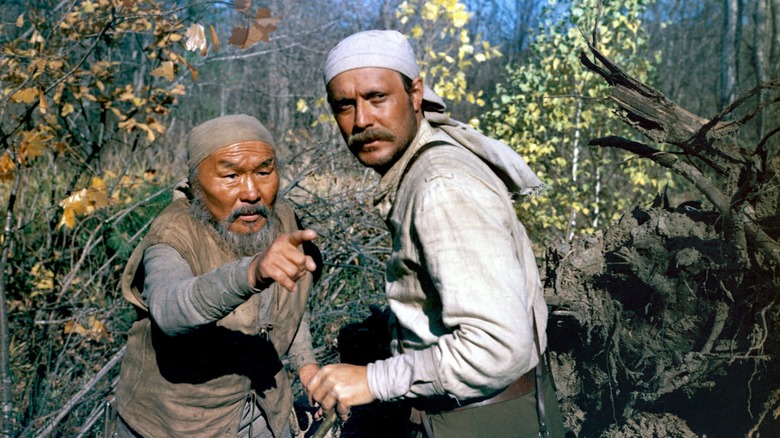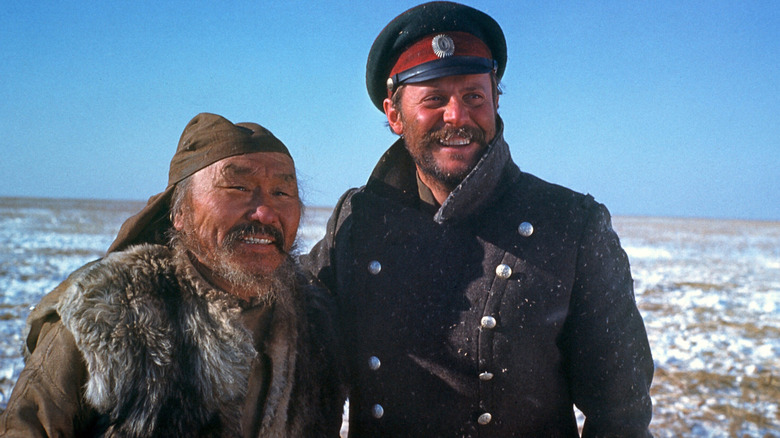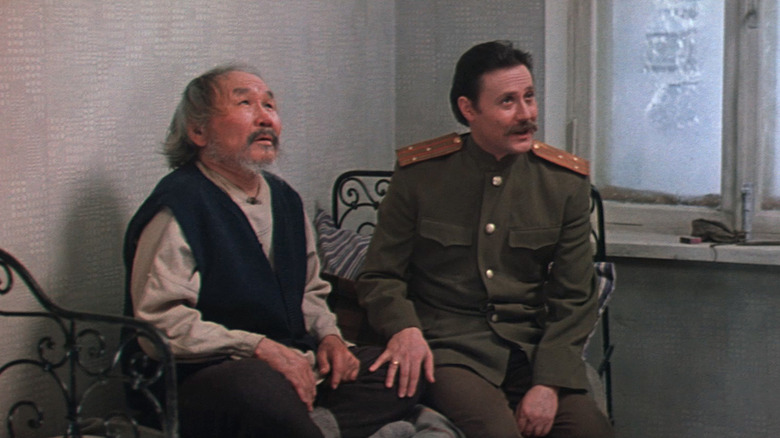Akira Kurosawa's Career Was Revived By This Classic '70s Movie
In 1971, Akira Kurosawa returned from a five-year filmmaking hiatus to write and direct "Dodes'ka-Den," his first film in color. "Dodes'ka-Den" was famously shot over only 28 days on a relatively low budget. Kurosawa aimed to prove to a younger generation of filmmakers that movies didn't require months-long shoots or giant budgets to work. Sadly, Kurosawa was proven incorrect. "Dodes'ka-Den" was a massive failure at the Japanese box office, and it was critically panned.
The film is set in, essentially, a landfill, and tells the semi-comedic story of the denizens who live there. No one seemed to like it, however, and its failure led Kurosawa into a deep despair. His sadness was compounded by his inability to find funding for any additional movies. He began to question if he was ever a good filmmaker, and Kurosawa attempted suicide.
Kurosawa's depression was alleviated, luckily, when he found a project that he could feel passionate about. The Russian film company Mosfilm approached him about a possible adaptation of the noted 1923 memoir "Dersu Uzala." He had long been interested in Vladimir Klavdiyevich Arsenyev's memoir, which told the story of Arsenyev's topography missions in the Siberian region of Russia, and the woods-dwelling trapper Dersu that helped him and his men survive. In 1975, Kurosawa traveled to the taiga regions of Siberia, where the book is set, and shot "Dersu Uzala," the first film he made outside of Japan. Kurosawa was given 100% creative control over the movie.
And it was successful by every measure. "Dersu Uzala" is one of Kurosawa's better movies, and one can feel the filmmaker breathing a hopeful sigh of relief. The story doesn't end happily, but there is a gentle, breathing passion beneath the movie. It saved Kurosawa's life.
Dersu Uzala saved Kurosawa's life
"Dersu Uzala" is about Arsenyev's mission to map a rarely visited portion of Russia's extreme north. Arsenyev (Yury Solomin) and his men are ill-prepared to survive for an extended period in such horrid circumstances. Luckily, they chance upon the kindly old Dersu (Maxim Munzuk), a Goldi man who knows everything about survival. Counter to what one might expect, Dersu is gentle and generous, sharing every bit of his knowledge openly. He notes that the hunters of the region all take care of one another, and Dersu teaches Arsenyev how to leave packages of food around for anyone who might happen by. If Dersu finds an abandoned hut, he stops to fix it, in case someone else might need to stay there.
In the film's most intense sequence, Dersu notes that a blizzard is about to hit, and he and Arsenyev won't have time to make it to shelter. If they don't do something quickly, they'll starve. The two men frantically pile up a mound of straw and grass to hide inside. Dersu cares for his compatriot.
Dersu, it should be noted, is presented as a small and peculiar man. He is stoic, but peaceful. He is frank and refreshing. And he is clearly possessed of deep fonts of knowledge that he, like a sage, may share. It may not surprise readers to learn that George Lucas modeled Yoda, the wise old Muppet from "The Empire Strikes Back," after Dersu Uzala. After a spell, Arsenyev has to return home to the big city. Dersu asks to be left in the woods, happy with his lot. He asks only that he be given some bullets for hunting purposes.
The story, however, doesn't end there.
Dersu Uzala has a sad ending
Fast-forward five years, and Arsenyev is back in the same region on business. He decides to look up Dersu, hoping to reunite with an old friend. The two men do find each other, and for a brief period, they survive in the woods together once again. Indeed, Dersu almost kills himself trying to rescue Arsenyev and his men from some vicious rapids. But not everything is as happy as it once was. Dersu is getting older. His eyesight is failing him, and his instincts are dulling. He shoots a tiger in self-defense, and is distraught that he had to harm such a beautiful animal. Dersu eventually moves back to the big city with Arsenyev.
Sadly, Dersu never feels at home. There is a devastating shot near the end of "Dersu Uzala" wherein the camera, locked down, looks at Arsenyev's family's living room. It takes a long time to realize that the pile of linens in the corner is actually Dersu, slumped over, withdrawn from life. The city is no place for a woodsman like Dersu. The ending of the film is tragic.
Kurosawa, as mentioned, had total creative control over "Dersu Uzala" and took a long time to shoot it. The entire production looks like it would have been a harrowing experience, with almost every scene taking place outdoors. But Kurosawa clearly felt connected with his art once again. It may also be a relief to hear that "Dersu Uzala" was a modest hit. It wasn't a blockbuster, but it did well enough to declare that Kurosawa was still a filmmaking force to be reckoned with.
Kurosawa followed "Dersu Uzala" with the Shakespeare-like "Kagemusha" in 1980, "Ran" in 1985, and several others. He died in 1998 at the age of 88.


